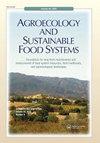Exploring the relationship between tree diversity and carbon storage in aboveground biomass of coffee agroforestry systems in southern Manabí, Ecuador
IF 2.6
3区 农林科学
Q1 AGRICULTURE, MULTIDISCIPLINARY
引用次数: 0
Abstract
ABSTRACTThe study was conducted at three sampling sites in the province of Manabí, Ecuador, designated for coffee production under an agroforestry system (AFS). A total of 21 plant species were recorded, and the carbon stored in live aboveground biomass was estimated. The results showed that coffee-based AFS has a high potential for carbon storage, and species diversity is related to the structural parameters and diversity of each sampling site. The implementation of coffee-based AFS is an effective strategy for the conservation of native flora and climate change mitigation in the area.KEYWORDS: Climate changegreenhouse effecttree diversitycoffee-based AFSproduction systems Disclosure statementNo potential conflict of interest was reported by the author(s).厄瓜多尔Manabí南部咖啡农林复合系统树木多样性与地上生物量碳储量关系的研究
摘要本研究在厄瓜多尔Manabí省的三个指定用于农林业系统(AFS)下咖啡生产的采样点进行。共记录了21种植物,估算了地上活生物量的碳储量。结果表明,基于咖啡的AFS具有较高的碳储存潜力,物种多样性与各采样点的结构参数和多样性有关。实施以咖啡为基础的AFS是保护当地植物群和减缓该地区气候变化的有效战略。关键词:气候变化;温室效应;树木多样性;基于咖啡的afs生产系统。
本文章由计算机程序翻译,如有差异,请以英文原文为准。
求助全文
约1分钟内获得全文
求助全文
来源期刊

Agroecology and Sustainable Food Systems
AGRICULTURE, MULTIDISCIPLINARY-GREEN & SUSTAINABLE SCIENCE & TECHNOLOGY
CiteScore
4.80
自引率
7.70%
发文量
73
期刊介绍:
Agroecology and Sustainable Food Systems is devoted to the rapidly emerging fields of agroecology and food system sustainability. By linking scientific inquiry and productive practice with transformative social action, agroecology provides a foundation for developing the alternative food systems of the future. The journal focuses on the changes that need to occur in the design and management of our food systems in order to balance natural resource use and environmental protection with the needs of production, economic viability, food security, and the social well-being of all people.
Agroecology and Sustainable Food Systems examines our current food systems from production to consumption, and the urgent need to transition to long-term sustainability. The journal promotes the study and application of agroecology for developing alternatives to the complex problems of resource depletion, environmental degradation, a narrowing of agrobiodiversity, continued world hunger, consolidation and industrialization of the food system, climate change, and the loss of farm land. The journal uses a food systems approach, and seeks experiences in agroecology that are on-farm, participatory, change-oriented, and backed by broad-based methodologies of sustainability analysis and evaluation.
 求助内容:
求助内容: 应助结果提醒方式:
应助结果提醒方式:


